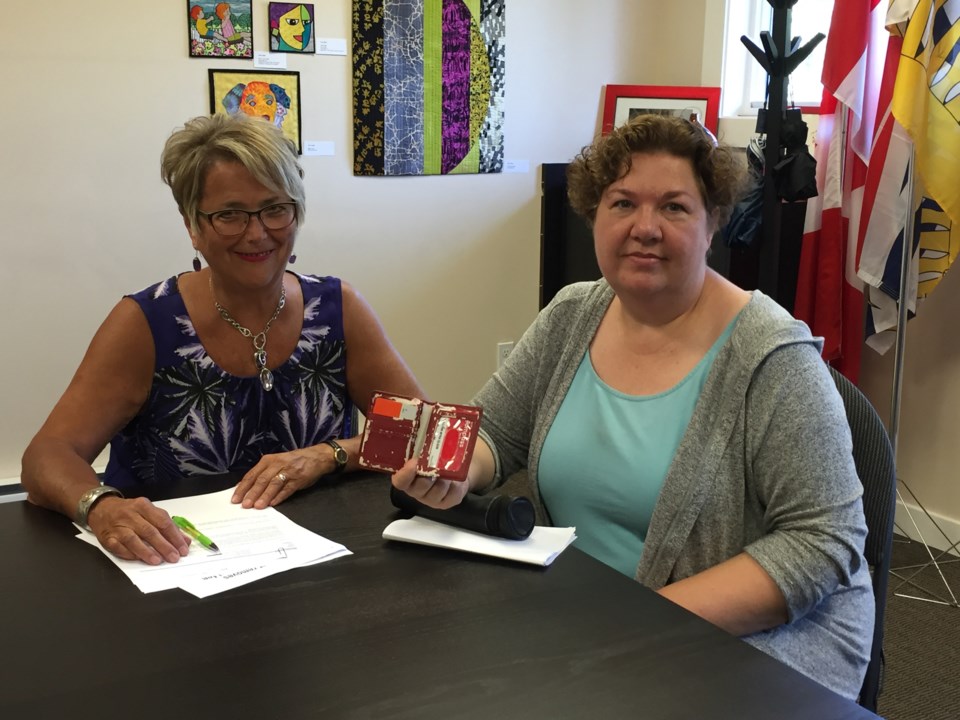Karla Olson is speechless – not because she doesn’t have the words but because she is fighting back tears – when describing her feelings about changes to bus passes for persons with disabilities.
Earlier this year, the provincial government announced it was eliminating the annual $45 bus pass for people with disabilities and is increasing the monthly allowance for people with disabilities by $77 a month. A monthly transit pass is $52, which results in a $25 monthly increase to people with disabilities.
“I guess my question is, is it a reasonable expectation that $25 will cover all the increases in costs that have been occurring over nine years to one’s basic living requirement?” said the New West resident. “It’s not.”
According to the province’s website, beginning Sept. 1, people receiving disability assistance who have the “persons with disabilities” designation have the option of keeping a bus pass and receiving a $25 monthly increase or cancelling their bus pass and receiving a transportation support payment of $52 and a $25 monthly increase.
While the government’s plan will result in a monthly increase of $25 to $77 a month, depending on whether individuals get a transit pass, Olson said it highlights the fact that people with disabilities haven’t had increases to their monthly rates for nine years and basic living costs continue to rise.
Olson, who suffers from a number of chronic conditions and is in physical pain daily, said the smallest of things can put her into “crisis mode,” so she’s stressed about the impact of the changes that take effect Sept. 1. “For people like me, whose disabilities can vary, having the bus pass with me provides me with security,” said Olson, who volunteers on two city committees. “It also gives me options. There are times I will go out, knowing that I can always come home by the bus. I have taken walks with my (walking) poles for exercise and I’ve had to come home on the bus. For me it’s very successful in providing opportunities to connect with my community in many ways. The bigger picture for me is also having access to health care.”
Since Olson began getting the bus pass about nine years ago, she said it’s allowed her to get to medical appointments, community events she might not otherwise be able to attend and, most recently, a part-time job in Kitsilano. For people like herself who have cognitive issues as part of their physical disabilities, she said the bus pass takes away the stress of thinking about fares, zones and time limits, as well as the impact on her finances.
With little money to spare, Olson plans to cancel her bus pass and gamble that she’ll spend less than $52 a month on individual fares.
A coalition of groups like Inclusion B.C. and the Disability Alliance of B.C. have spoken out against the changes and called for increases to payments to persons with disabilities.
Olson wrote a three-page letter to B.C. Minister of Social Development Michelle Stilwell last week, in which she stated the province hasn’t increased the disabilities allowance for nine years. In that time costs for rent, food, clothing, electricity, insurance and health-care supplements and support have continued to rise.
“Having only a $25 increase to the supplement is simply not enough,” she wrote. “By increasing my costs to access public transportation, the ‘choice’ you have offered me is between paying for my basic survival needs or having a monthly bus pass.”
New Westminster MLA Judy Darcy said persons with disabilities get a monthly housing allowance of $375 and face rising costs for the necessities of life such as food and accommodations.
“Affordability of daily life is crushing for people right now,” she said. “It’s getting steadily worse, especially because of the cost of housing, but also there’s so many things happening at the same time.”
Darcy, the NDP’s health critic, fears people with disabilities could become more isolated if they don’t buy a monthly bus pass. She said that choosing whether to use the money for a bus pass or other necessities of life is one additional stressor for people who live with challenges.
“Supporting people with disabilities upstream prevents greater costs for health care downstream,” she said. “I don’t think there’s any question about that for the general health care system as well as mental health. We know that one in five British Columbians struggles with mental health issues in one way or another. We are making people’s conditions worse, absolutely we are. Isolation for people of any age is a contributing factor to declining mental health as well as deteriorating physical health.”
The social development minister was unavailable for an interview and the Record didn’t receive a statement from the minister by press deadline. In a statement released after the Record’s deadline, Stilwell said the government is investing an additional $170 million to raise assistance rates for people with disability in B.C. and the increase provides fairness in the system and more choice for people on disability assistance.
According to Stilwell, currently only about half of the people receiving disability assistance receive transportation supports in the form of a subsidized bus pass or special transportation subsidy, and the other half get no extra support. With the changes taking effect Sept. 1, she said everyone will receive the same level of benefits.
“While I understand that people hoped to see a larger increase in rates, these changes do ensure everyone receiving disability assistance will benefit,” she said in an emailed statement.



